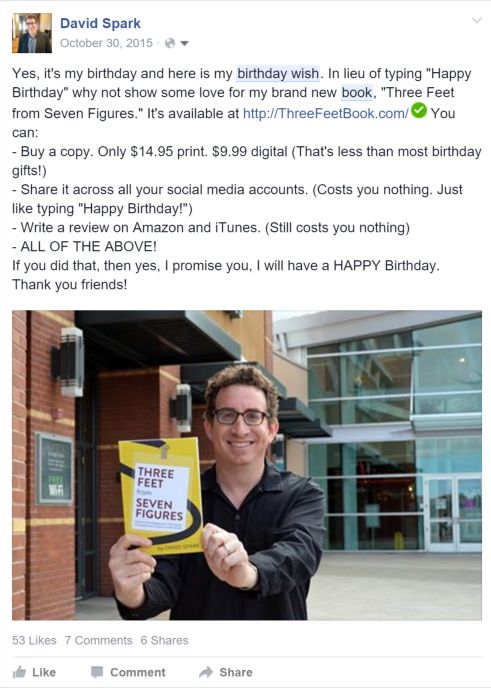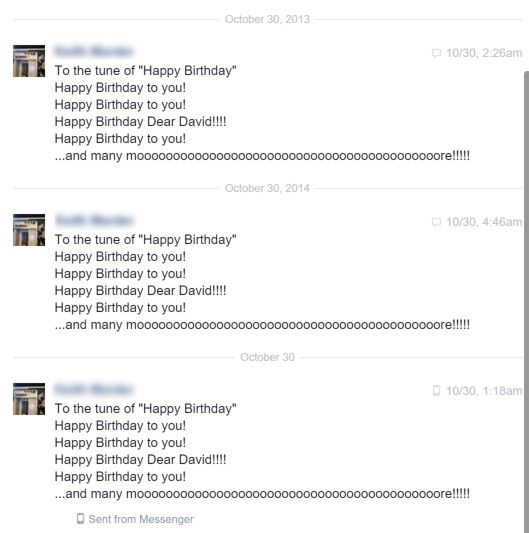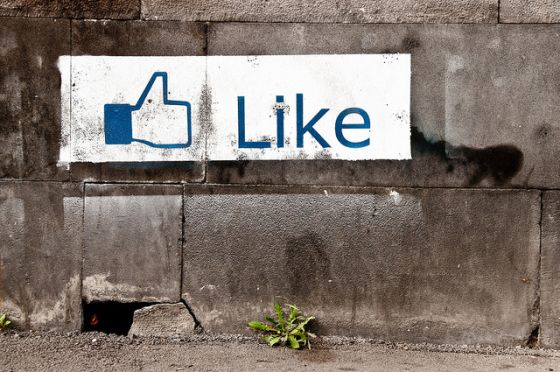This morning my friend Matt posted a picture of his newborn baby. I hit the “Like” button, and I was done.
Facebook gave me an outlet to show my happiness for him, while clearing my conscience that I should do anything else. This friend-to-friend interaction affords me the ability to show interest by simply clicking an icon.
 I “Liked” my friend’s newborn baby picture. I didn’t bring over a ready-made dinner.
I “Liked” my friend’s newborn baby picture. I didn’t bring over a ready-made dinner.
Prior to the advent of Facebook, Twitter, and LinkedIn, we put in some effort to acknowledge a friend’s or colleague’s life event. We would call them on their birthdays, send a sympathy card when they lost someone, or put in a good word for them at the office. After our forthright expression we’d be thanked for our gesture and often without thinking we’d respond, “It’s the least I could do.”
At the time we didn’t realize how wrong we were.
There’s a lot less we can do.

Social media gives us the ability to make a barely active (a.k.a. “lazy”) connection
Think about how minimal the actions we take on social media today are to show our appreciation. Hitting the “Like” or “Retweet” button only takes the effort of raising your finger and then lowering it. What could you possibly do that’s less? It truly is “the least you could do.”
Your birthday isn’t about you. It’s about what your friends want to do.
Many of you have read (see #5) my tirades about valueless “Happy Birthday” messages on Facebook. Similar to just clicking “Like,” just typing the two words “Happy Birthday” is truly the least one can do for someone’s birthday.
This year, I tried an experiment, to see if people would read and acknowledge my birthday wish even if it didn’t take any more effort than typing in the words “Happy Birthday.”
I recently published a book, Three Feet from Seven Figures: One-on-One Engagement Techniques to Qualify More Leads at Trade Shows. It’s available at ThreeFeetBook.com.
Seeing an opportunity for free publicity on my birthday, I reached out to my friends. In a Facebook post, I asked my friends to please share a link to my book with their network. Twelve friends listened and did just that. Thank you. The rest “Liked” (53) or commented (7) on my request, or they just typed in the words “Happy Birthday” (200+) on my Facebook wall.

Even when presented with an easy alternative that’s a hair more difficult than “the least you could do,” most of your Facebook friends will choose “the least they can do.”
I’m amazed at how so many people are fooled into believing that hundreds of messages that only say “Happy Birthday” are an outpouring of love. You’ll often see posts from birthday recipients thanking their friends for all their kind words, and wishing they could respond to each and everyone one of them. Don’t fall for it. It’s not an outpouring of love. It’s “the least they could do.”
It’s not that my friends are uncaring, or your friends don’t care about you. It’s just that social media, and predominantly Facebook, has given us the opportunity to spread our caring for all our friends so thin that we’re only capable of doing “the least we can do.”
How void of meaning are most birthday messages? Take a look at this three-year conversational engagement with one of my birthday well-wishers.

That’s it! For three years he’s pasted in the “Happy Birthday” song. That is my entire communications with him over the past three years.
We’ve been programmed to do “the least we can do”
Facebook alerts us to our friends’ birthdays thereby suggesting we wish them a “Happy Birthday.” We adhere responding en masse with “Happy Birthdays.” Our friends show their thanks with a follow up “thanks for all the love” post. Given the positive response, we’re validated for doing “the least we can do.”
We do this as well when struck by tragedies. For example, last year when terrorists killed 130 people in France, we were stunned, shocked, and horrified. We wanted to do something, but it’s hard to know what to do. Seeing that people were at a loss for action, Facebook suggested we colorize our profile image with the French flag to show our support for the people of Paris. Friends post that their “thoughts and prayers” are with the families. Comedian Anthony Jeselnik perfectly summed up our real intentions when we post our “thoughts and prayers.”
We continue to remain validated as “taking action” even if we’re truly doing nothing to help. Yes, changing your profile image to the colors of France’s flag may raise awareness, but what it says is you’re raising awareness in the least disruptive way possible. By engaging in these “barely doing anything” actions, we’ve fooled ourselves into believing we’re doing something.
Often we don’t know what to do beyond “the least we can do.” It doesn’t seem right to do nothing in face of such a tragedy. We have to say or do something. Thankfully Facebook has given us an opportunity to do just that. You don’t even need to think about what you have to do, just color your profile image or announce that your thoughts and prayers are with the families and you’ll be seen as being compassionate. This simple “least you can do” action gets you off the hook of doing anything more.
We’ve reached the bottom rung of “engagement”
Talk to anyone who works at a non-profit and they’ll tell you about the bane and benefit of social media. Known as slacktivism, people who apparently care about a non-profit will show their appreciation by “Liking” or retweeting, but never volunteering or donating.
In this age where a sign of a friend is somebody who only “Likes” your posts, the gestures of those who do a little bit more, which used to be the norm, are seen as going above and beyond. Here are some of the actions friends and colleagues have done for me that I truly remember and appreciate:
- Those who wrote funny and insightful comments on my articles or shared my articles with thoughtful introductions.
- Families who made meals for my family after the births of our two sons.
- Friends who made warm business introductions.
- Friends who shared and promoted my book.
Not only do I appreciate it, but I made sure to thank and/or acknowledge those people who did a little more than the least that they could do.
Facebook has shown us how little we can do while still being seen as doing something.
As for my friends and readers, don’t you want to do more than “the least you can do?”
Creative Commons photo attribution to Marco Fieber/Ostblog.org, Sean MacEntee.




